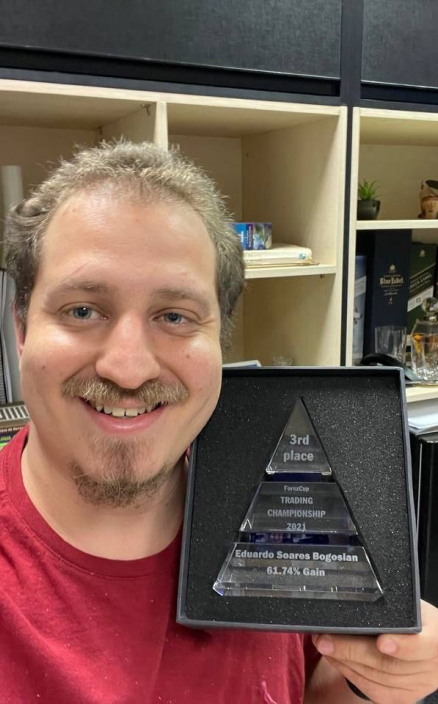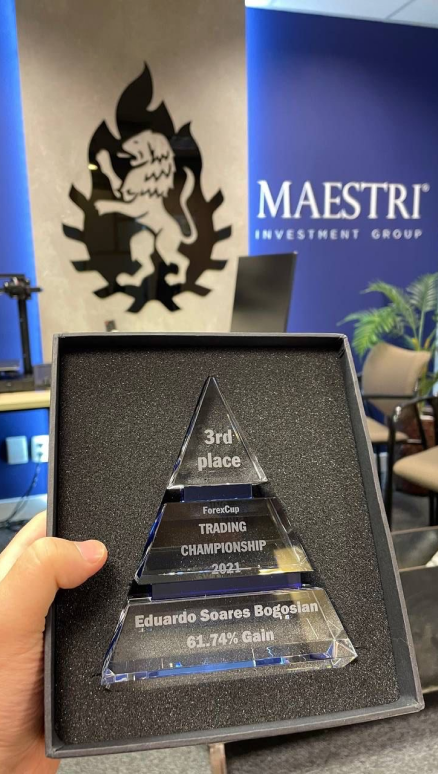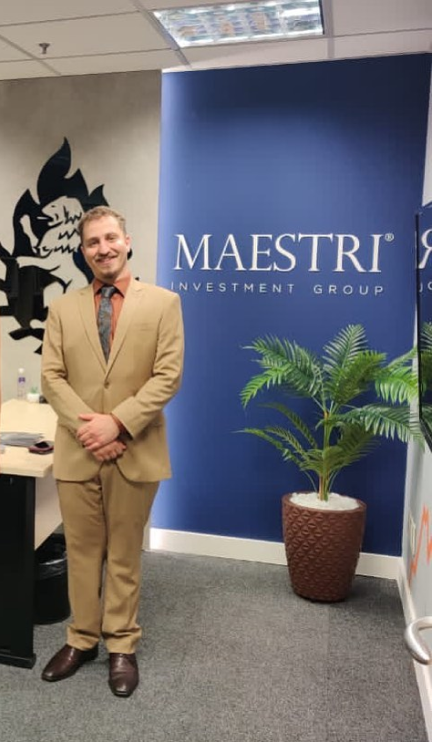FTC 2021 THIRD PLACE WINNER: EDUARDO SOARES BOGOSIAN
Eduardo Soares Bogosian from Brazil took third place in the championship. Eduardo wasn't the first to register for FTC 2021, but he was able to quickly break into the lead. He revealed some details about his background as a trader and shared a few secrets about the trader's motivation.
Can you tell us a bit about your educational & professional background? Is it in any way aid to your trading career?
My trading education began informally back in 2008, and I made my first steps as a professional trader in 2010. In 2013, I enrolled at university for a bachelor’s in administration and focused on finance. About two years in, I started providing consultancy work in decision analysis as well as doing my own trading for myself, which then evolved into joining in with a group of friends where I headed an investment club. This all helped me learn and establish a good track record and consistent results. In 2018 I started my own investment company, Maestri, and partnered with FXOpen using their PAMM system to be able to offer good investments to global investors. Thus, we can offer investors from all over the world to join our strategies, with any amount of money, even if it is just one dollar.
Apparently, you've come a long way to get to this point. Who and when introduced you to trading?
I’d say it was my father who introduced me to trading around 2008-2009. He was a programmer and when I told him about my interest in the financial markets and how I wasn’t satisfied with what some books were telling me, he lent me some of his books on indicators and data analysis.

Did you use the help of supervisors or mentors when you decided to devote more time to trading, or did you rely solely on your personal experience?
No, it was vastly my own personal experience and chatting with other traders. The closest I came to supervisors was when I’d purchase an indicator or group of them and would participate in presentations from some trading school or brokerage showing their indicators. So I spent a lot of time on Google and forums.
Can you remember your worst and best trades?
My worst trades were all that I made without following a trading plan or strategy. Even if they were profitable, I’d say those are based fully on instinct. I am not saying that instinct is bad, quite the contrary, it is very important, there is a difference between using those instincts to create something that you can follow, trace back and improve, and trying to come up with something on the spot.
My best trades were, on the other hand, those where I followed my instinct and followed through with a plan. My best trade was my first favorite trade when I invested in oil back in 2010. Since then, I learned more and more about the significance of having something written down and planned out.
And what keeps you motivated to keep trading when taking a loss?
It can be hard, but it is important to understand yourself. In 1979 very interesting research came out which led to the field that we today know as Behavioral Economics. In it, we learned that we have something that is called the “Loss-Aversion Bias”, so losses hit harder than gains in that same amount. Taking an active look at how you are reacting and comparing previous results to current losses can really put things into a better perspective.

Do you follow any major media on market data? Can you name any outlets of your choice, be it websites or TV?
Absolutely, I love to keep Bloomberg TV running in the background while I work. Another place I love to follow for statistics and technical analysis is FinViz and TradingEconomics.
And now let's move on to your trading routine. Can you reveal some techniques and strategies you use?
Although I don’t want to get into too much detail, I can reveal that Risk Management and Technical Analysis are what I mostly work on during my day.
Do you have any general beliefs about the market that guide your behavior as a trader and investor?
I think we all have some type of basic understanding of what we think the market is. Personally, I’d say that everyone that is in it wants to make money, if I can understand where they are coming from (from a mental and financial standpoint) then I can work with that to my advantage.
Do you utilize Expert Advisors?
Absolutely, EAs are one of the most important aspects of my work. Money never sleeps but I do, so a well-programmed expert advisor can help shield and boost my investments.
Taking the time to program and keep them up to date is probably the best investment I make.

Are you engaged in any professional activities besides trading and your investment company? Do you have any hobbies?
Professionally, I still like to work in consultant jobs. I love building and optimizing. As for hobbies, I love to travel. I am a Scuba Diver, a Rally driver, and I am working on getting my pilot’s license! I also do like to play my fair share of video games, like money management simulators.
Do you share your experience and knowledge in any way, perhaps by publishing educational content or conducting seminars?
Sure! Covid led to a temporary halt, but I give seminars on personal finances at my alma mater every year, which I even adapted to an online course, and we are working on expanding that. I have also been thinking about publishing a yearly book on statistics and financial analysis of some markets to help others make their decisions.
You willingly spoke about yourself and your trading experience in an interview. Why do you think many traders shy away from publicity?
Based on what I have seen, I can think of at least three reasons:
First, they might be worried about what others are going to say. Finance is a very competitive environment at the same time it is also very private. So, coming out publicly and talking about it can garner a lot of negative comments.
Also, there is a factor of fear of having their strategies copied. I think I can speak for just about everyone that we all work very hard on our strategies. Whenever I talk to other traders, they keep it pretty close to their chest, even at pubs in financial districts like London and New York! So, I believe that this might be the reason.
To summarize, public talking is generally hard for most people. I started with small groups before I moved my way up to auditoriums. Maybe they just haven’t had that experience yet.

Do you see yourself as a mentor to other traders in the foreseeable future?
I am not sure. I can definitely see myself helping someone interested in trading and would like to know more about it, and get deeper into the subject. But to fully mentor someone, I think I would need to have more time than I have now. My focus for at least the next couple of years is my company.
What’s your best advice for traders who want to become independent and trade full time?
To become a full-time trader or an independent trader I would say you need to have a few things in mind and be ready to focus on them.
First, It’s not easy money and there is no punch-in, punch-out time, because when you work for yourself it's full time.
Second, start with the basics and re-creating common strategies, then expand on them.
Last but not least. Be ready for bad times. I noticed that having at least 6 months of money saved up made me make better decisions. Not having that pressure of living from trade to trade can take you a long way.
